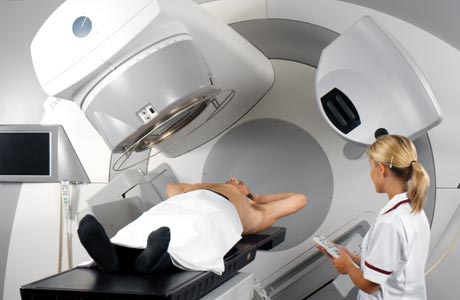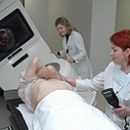As used for the treatment of bowel cancer, radiation therapy? What side effects have this treatment methods and how to avoid them or alleviate? Read in this article.
Content
Radiotherapy
Radiotherapy is used to effect on cancer tumors with high-energy emission that destroys cancer cells, causing, if possible, minimal harm to normal cells.
Radiotherapy is used in a number of cases for the treatment of thick and rectum cancer.
Auxiliary radiotherapy
Auxiliary radiotherapy is used to treat a rectum cancer, if there is a reason to believe that cancer cells remained in the pelvic area, the dimensions of which are too small to be detected. As a rule, for the treatment of colon cancer, auxiliary radiotherapy does not apply.
Preoperative auxiliary radiotherapy
Sometimes patients with rectal cancer in cases where the tumor has large sizes or is fixed. Prescribe preoperative radiotherapy. Such treatment is carried out in order to reduce the size of the tumor, as well as facilitating the operation.
Radiotherapy in the case of secondary cancer
Radiotherapy can be used to reduce the sizes of cancer in the event of a relapse, especially in the field of pelvis, as well as in order to weaken symptoms, such as pain.
Treatment planning
Radio therapy sessions are carried out in the Radiotherapeutic Hospital Cabinet. Typically, the course consists of 5 sessions and is carried out from Monday to Friday inclusive with the following holidays on the weekend. The total duration of treatment will depend on the type and size of the tumor. The doctor will discuss with you the type of treatment.
 To ensure that you get maximum benefit from treatment, it must be carefully planned. During your first few visits to the radiotherapeutic cabinet, you will be asked for a large car, which is called the modeling device. It makes X-ray pictures of the body of the body that is subject to irradiation. Sometimes for the same purpose you can use the scanning device. Treatment planning — Very important component of the entire course of radiotherapy, and sometimes the patient has to visit the radiotherapy Cabinet several times before the doctor who develops a treatment plan will remain pleased with the result obtained.
To ensure that you get maximum benefit from treatment, it must be carefully planned. During your first few visits to the radiotherapeutic cabinet, you will be asked for a large car, which is called the modeling device. It makes X-ray pictures of the body of the body that is subject to irradiation. Sometimes for the same purpose you can use the scanning device. Treatment planning — Very important component of the entire course of radiotherapy, and sometimes the patient has to visit the radiotherapy Cabinet several times before the doctor who develops a treatment plan will remain pleased with the result obtained.
On the skin surface you will be labeled in order to help the X-ray, which will conduct an irradiation session, to accurately put or sit in the right position and show where the rays need to be sent. These marks should be maintained throughout the course of treatment, but at the end of the course they can be washed. Before the start of the radiotherapy, you will be given instructions on how to care for the skin around the upcoming exposure zone.
Before each radiation session, the X-ray will help you take the necessary position on the couch (sitting or lying) and make sure that you are comfortable. At the time of the procedure itself, which lasts only a few minutes, you will be left in the office of one, but you will have the opportunity to talk to the X-ray, which will observe you from the adjacent room. This procedure is painless, but you will have to lie or sit still within a few minutes.
Side effects
Radio therapy of the colon can cause side effects such as nausea, vomiting, diarrhea and fast fatigue.
 Some patients notice that they began to urinate more often. These side effects can disturb the patient to a greater or lesser extent, depending on the intensity of the radiotherapy dose and on the duration of the designated course. However, most of them can be removed or weakened with special drugs, therefore, in case of the appearance of some problems, you should inform the doctor.
Some patients notice that they began to urinate more often. These side effects can disturb the patient to a greater or lesser extent, depending on the intensity of the radiotherapy dose and on the duration of the designated course. However, most of them can be removed or weakened with special drugs, therefore, in case of the appearance of some problems, you should inform the doctor.
Effective means against nausea are usually antiwest pills that your doctor may prescribe you. When the course of radiotherapy is published, it is important to drink a lot of fluid and observe a healthy diet. If you do not have an appetite, you can replace the usual food with high-calorie nutritional drinks that are sold in many pharmacies. Try to rest as much as possible, especially if you have to do a long way to get a long way to get the next radio therapy session.
All side effects should gradually disappear upon completion of the course of treatment, but if this does not happen, you need to inform your doctor.
Radiotherapy does not make you radioactive, so during the entire course you can safely communicate with other people, including children.
Subsequent medical observation
After you pass the appointed course of treatment, your doctor will regularly invite you to a control inspection and X-ray examination, and sometimes on the conduct of colonoscopy.
It can continue for several years, but over time it will happen less.
But if you have any problems or you will notice new symptoms — Immediately put about this not knowing your doctor.









